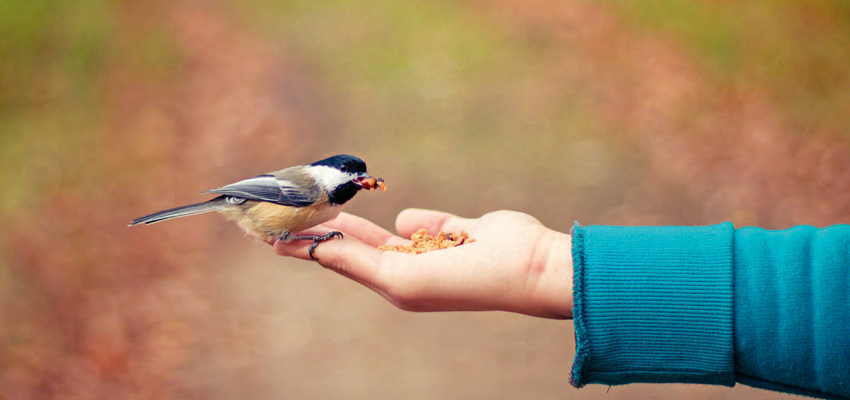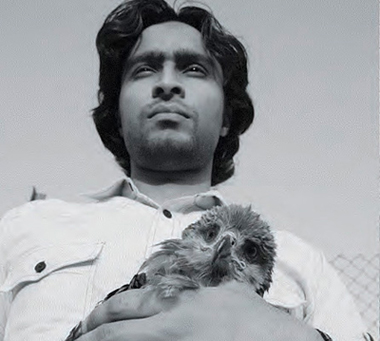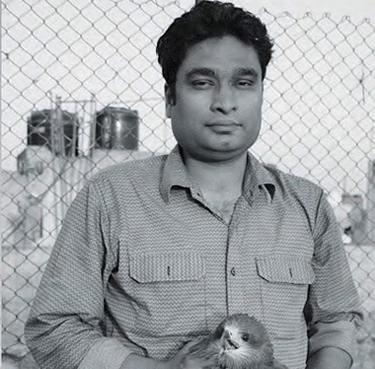They are not veterinarians, but they heal birds

“Birds are indicators of the environment. If they are in trouble, we know we’ll soon be in trouble.”
-Roger Tory Peterson
"Through our experience, we have discovered that veterinarians did not always have the required knowledge about birds. We did not have anyone to go to and look for help. Either we had to perform surgeries on the wounded bird ourselves or watch it die. This made us experts in avian orthopaedic surgery"
-Nadeem Shehzad
 Nadeem Shehzad
Nadeem ShehzadMeet two youth from Delhi who easily stands out in a crowd. Their love and compassion for birds have earned them a unique place in society. An incident that occurred in 2003 was the turning point in their lives. That day, they found an injured black kite on their terrace. Out of compassion, they picked it up, and took it to the Jain Bird Hospital in Chandni Chowk, Delhi, for treatment. But since the injured bird was carnivorous and the hospital was situated within a temple complex, they summarily refused to treat it. The brothers managed to arrange ‘home visits’ by a veterinarian and finally released the black kite after it had fully recovered.
Since that incident of treating a lone kite, they have sheltered, treated and looked after many birds such as owls, eagles, kites, hawks and the occasional endangered vulture. Without any formal training, they have learned to fix bones using steel wires, stitch wounds using absorbable thread, perform complicated surgeries, and even prescribe medicines simply by observing veterinarians over the years. Today, Nadeem Shehzad and Mohammad Saud have saved more than 5000 predatory birds. For more than a decade now, they have been saving birds of prey in their rooftop-turned-shelter in Chawri Bazaar, Old Delhi. They run a 24-hour bird rescue organisation that provides medical treatment and shelter to predatory birds.
“Not only are these birds being deprived of their natural habitat and diet because of urbanisation, they also face severe danger because of the use of the manjha, a glass-shard coated string to fly kites,” says Saud. “The new Chinese, metal-coated plastic thread that kite-lovers use slices through their bodies like a knife.”
“Through our experience, we have discovered that veterinarians did not always have the required knowledge about birds. We did not have anyone to go to and look for help. Either we had to perform surgeries on the wounded bird ourselves or watch it die. This made us experts in avian orthopaedic surgery,” says Nadeem.
Interestingly, without being professional vets, they have managed to learn how to treat the birds through consulting books and doctors. They run a family business of making metallic soap dispensers and fountain nozzles. Their love for the winged creatures makes them draw money from their business earnings for this noble cause. Today, many wildlife organisations call them for help every day! Their motorcycle operates as an ambulance for their registered bird rescue organisation, “Wildlife Rescue”, for which they have launched 24x7 bird rescue helplines.
"Not only are these birds being deprived of their natural habitat and diet because of urbanisation, they also face severe danger because of the use of the manjha"
-Mohammad Saud
 Mohammad Saud
Mohammad SaudSoon, the two began questioning the existing protocol for treating bird injuries in India. “Veterinarians often do not attempt to suture bird wounds as they are so minute. But this invariably denies the healed bird the ability to fly. Their ‘kabootarbaaz’ neighbour had always stitched broken wings with regular needle and thread with good results. So, we researched international protocol, and began stitching broken wings with soluble sutures,” explains Saud who does most of the surgeries in Wildlife Rescue today. With a success rate of about 80%, the brothers receive injured birds rescued by different NGOs and Wildlife SOS.
Wildlife Rescue’s 24-hour helpline receives at least 15 calls a day, and children in Wazirabad village where they now have a larger rescue centre, routinely bring in not just birds, but also other animals. Shahzad has remained Delhi’s Honorary Wildlife Warden for three years and was appointed Special Officer of Wildlife Crime Control Bureau in 2013. The brothers also received awards from animal conservation organisations such as, India for Animals and Nature Forever Society in 2014. Interestingly, the rooftop facility can rightly boast of almost a hundred kites, eagles, vultures and owls that are in different stages of recovery. Some have bandages on, labelled with dates. Saud shows neatly stitched wings and cuts on several of his patients. “They’ll soon be able to fly,” he says, stroking them gently. He then soberly picks up a vulture with a broken wing. “It came too late for us to repair the wing,” says Saud, “I’ll have to amputate it today.” They have started doing bone implants and also want to learn micro-surgery which will minimise the need for amputation. In the basement, a nursery of frisky Egret chicks is ensconced in cartons. “They were orphaned when the tree that housed their nests was cut down in Gurgaon. Over 80 chicks died before they could be rescued; merely 20 remain.”
Funds are a major concern for the brothers. It has been more than a decade, but still, finance for some 95% of the expenses in their rescue efforts goes out of their own pockets. The need of the hour is to make their organisation self- sustaining, so that it keeps functioning without their help. They believe that with no facility for birds of prey, it is their moral responsibility to do something for them. “The fact is that without our help, these birds will end dying a slow and painful death,” they quip.”
Maintaining the avian hospital costs about Rs.35,000 per month, mostly for food and medicines. The brothers also employ a person to attend to rescue calls on the helpline. Although they still haven’t received any aid, the two brothers dream of setting up a full-fledged bird hospital of international standards by diverting funds from their jointly run family business. The morning after the visit to their avian hospital, the unfortunate vulture doesn’t survive the surgery. Instead of feeling disheartened at the failure, an optimistic Shahzad says, “It is an act of faith to ease the last days of even a half-dead vulture with a broken wing.”
Some national and international media has covered their work, and they were recently awarded the Wipro-NFS Sparrow Award. They were quite amused on receiving the Sparrow Award “since they work on sparrow hawks that eat sparrows,” they joke.